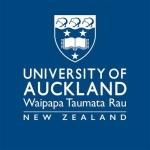University celebrates Prime Minister's Science Prizes
The University of Auckland is delighted that 2012 Prime Minister’s Science Prizes have been awarded to conservation scientist Dr James Russell and to school student Hannah Ng for research conducted at the University.
Dr Russell, from the School of Biological Sciences and Department of Statistics, received the Prime Minister’s MacDiarmid Emerging Scientist Prize for his internationally-recognised conservation work.
Dr Russell uses an innovative combination of ecology, statistics and genetics to study how rats and other mammalian pests invade predator-free islands and how to prevent this from happening. His work is helping to protect endangered native species and to maintain New Zealand’s reputation as a world leader in island conservation. With more than 80 per cent of the world’s island groups infested with rats, his expertise is also sought internationally to help eradicate and manage pest species.
His doctoral research examined how far rats could travel to predator-free islands and how they spread once they arrive. It led to greater understanding of how pest invasions occur and to new pest management techniques. Dr Russell is now focusing on the interactions between climate change, native and invasive species and ecosystem linkages, to help conserve native species.
He will spend several months in France next year working on conservation projects, and is involved with the Department of Conservation and philanthropist Gareth Morgan on the “Million Dollar Mouse” eradication project on the Antipodes Islands.
Hannah Ng, a 17 year-old student at St Cuthbert’s College, won the Prime Minister’s Future Scientist Prize for research conducted at The University of Auckland that has produced a new theory about short-sightedness (myopia).
Hannah took part in the scientist mentorship programme at the University’s Liggins Institute and worked with Professor John Phillips and others at the Myopia Laboratory in the Department of Optometry and Vision Science. She discovered that blurring the peripheral vision could increase the rate of short-sightedness, and her work suggests that the number of photoreceptors in the eye exposed to blurring determines the degree of myopia progression.
Her research will now be extended by Professor Phillips’ laboratory and may eventually lead to changes in the way glasses and contact lenses are designed, to help slow myopia progression in children. Around one quarter of the world population is affected by myopia, with rates as high as 80% in some countries, and in severe cases it can result in sight-threatening conditions such as glaucoma and retinal detachment.
The University also congratulates alumnus Peter Stewart, who received the 2012 Prime Minister’s Science Teacher prize. Mr Stewart graduated from the University with a Bachelor of Science degree in chemistry and mathematics and later became a teacher. He is now the Head of Chemistry at Papatoetoe High School.
